Bahçeşehir University – Bahcesehir University (BAU) is deeply committed to advancing the Sustainable Development Goals through active participation in international research, data collection, and collaborative evaluation initiatives. The university plays a leading role in generating evidence-based insights and developing measurable approaches to sustainable development.
Examples of ongoing projects and initiatives under this framework are presented in the section below.
1.Bahçeşehir – Bahcesehir- University and International Partners in RETORNA Project: Advancing Biotechnological Innovation for Sustainable Health Solutions: Sustainable Development Goal 3 and 9
The image below shows a screenshot from the official website of the RETORNA Project, indicating Bahcesehir University’s partnership with international institutions.
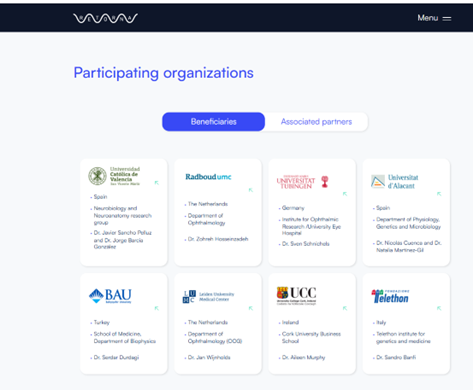
Bahçeşehir University – Bahcesehir University- participates in the RETORNA Project, an international, interdisciplinary research initiative funded under the European Union’s framework, aimed at developing RNA-based therapies to restore sight and advance innovation in vision science. The name RETORNA, meaning “to give something back” in Latin, reflects the project’s mission to restore sight through scientific excellence and technological progress which supports SDG 3 (Good Health and Well-being) and SDG 9 (Industry, Innovation and Infrastructure).
In addition to advancing biomedical innovation, the project also examines the potential economic and social impact of RNA-based health technologies across European countries. This dimension explores how biotechnology and research-driven innovation can contribute to sustainable economic growth, employment opportunities, and equitable access to healthcare solutions.
Representing Türkiye, Bahçeşehir University’s School of Medicine, Department of Biophysics, led by Dr. Serdar Durdagi, contributes to the scientific coordination and implementation of RNA-based therapeutic research.
The images below show screenshots from the official website of the RETORNA Project, indicating the participation of Bahcesehir University’s Prof. Dr. Serdar Durdagi as a member of the project’s Quality Board.
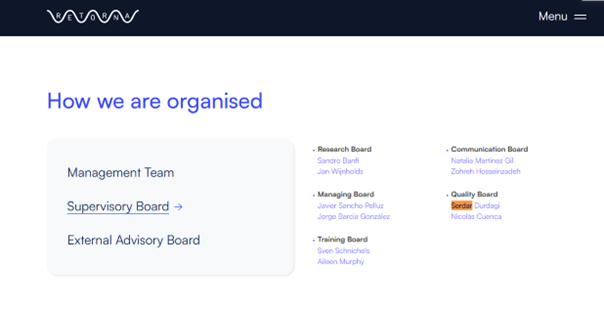
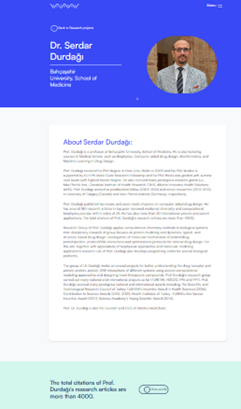
The project brings together leading European universities and research centers—including the Bahcesehir University (BAU - Turkey), Universidad Católica de Valencia (Spain), Radboud University Medical Center (The Netherlands), University of Tübingen (Germany), Universitat d’Alacant (Spain), Leiden University Medical Center (The Netherlands), University College Cork (Ireland), and Telethon Institute of Genetics and Medicine (Italy).
Within this 36-month project program, partners from across Europe conduct pioneering research projects under the supervision of leading scientists, including Bahçeşehir University faculty members. RETORNA promotes innovation in biotechnology by integrating cutting-edge research with advanced training in scientific and transferable skills, preparing the next generation of researchers for impactful careers in academia, industry, and the public sector.
The initiative exemplifies international collaboration in research and innovation, uniting universities, research institutes, and non-academic partners in developing sustainable technological solutions for global health challenges. By strengthening scientific infrastructure, fostering innovation, and advancing high-impact biotechnology research, RETORNA contributes directly to SDG 9 (Industry, Innovation and Infrastructure) and SDG 3 (Good Health and Well-being).
2.HI-GLOBE Project: Global Citizenship through Language Learning
The image below shows the homepage of the official website of the HI-GLOBE Project.
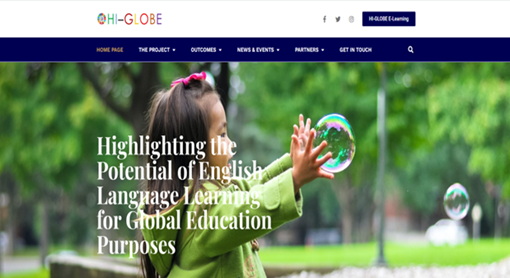
The HI-GLOBE Project is an international research and educational development initiative implemented in partnership with Bahçeşehir University (Türkiye) - Bahcesehir University - PELICAN Language School (Czech Republic), PRISM (Italy), the Foundation for the Development of International and Educational Activity (FRAME, Poland), the European Center for Quality Ltd. (ECQ, Bulgaria), and PROMIMPRESA (Italy).
The project is funded by the Erasmus+ Program of the European Union.
The image below shows a screenshot from the official website of the HI-GLOBE Project, displaying Bahcesehir University and other internatioanl partner institutions.
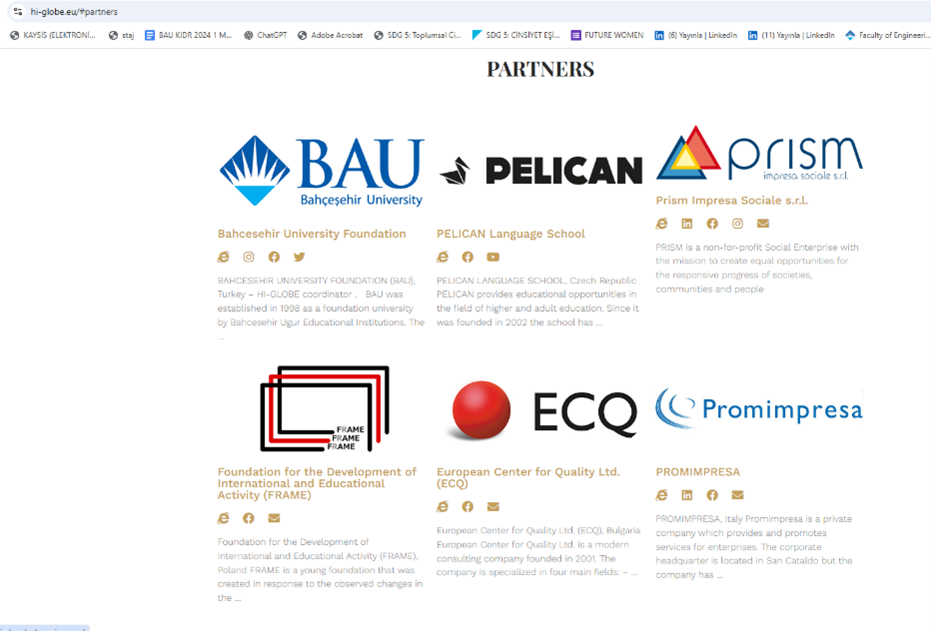
In today’s interconnected world, there is a growing need for responsible, informed, and globally minded citizens.
The HI-GLOBE Project harnesses the potential of English language learning as a means of promoting civic engagement, social awareness, and global responsibility among adult learners.
Its central aim is to identify and develop innovative pedagogical approaches that transform language learning from a mere educational goal into a tool for personal growth and sustainable societal development in the context of Sustainable Development Goal 4 (Quality Education).
Grounded in the socio-cognitive approach to second-language acquisition, the project emphasizes that language learning should not be an isolated cognitive process, but rather a collaborative, interactive, and experiential journey.
The interactive and innovative HI-GLOBE learning modules developed through this partnership are designed to enhance learners’ global citizenship competences while simultaneously improving their linguistic proficiency.
By creating a holistic, socio-cognitive learning environment, HI-GLOBE empowers individuals to become active, conscious participants in building a more inclusive and sustainable world.
3.STE²AM: Shaping the Future through Interdisciplinary and Entrepreneurial Education Project
The image below shows a screenshot from the official website of the STE²AM Project, displaying Bahcesehir University and other international partner institutions.

The STE²AM Project — integrating Science, Technology, Engineering, Arts, Mathematics, and Entrepreneurship — embraces an interdisciplinary approach to education that links creativity, innovation, and practical problem-solving.
By combining analytical and artistic disciplines with entrepreneurial thinking, the project seeks to nurture future-ready leaders and innovators who can design sustainable and impactful solutions for global challenges.
The project partners include Gaziantep University (Türkiye), Vilnius Gediminas Technical University (Lithuania), Centro de Enseñanza Universitaria SEK SA – Camilo José Cela University (Spain), Escola Professional CIOR (Portugal), Bahçeşehir University – Bahcesehir University (BAU - Türkiye), International Telematic University UNINETTUNO (Italy), and Aristotle University of Thessaloniki (Greece). The initiative is supported by the European Union’s Erasmus+ Program.
Through research, comparative analysis, and the exchange of international best practices, STE²AM contributes to improving the quality and inclusivity of education in STEAM fields, while promoting a learning culture rooted in innovation, sustainability, and cross-border collaboration.
4.REACH OUT: Empowering Teachers to Build Trauma-Sensitive Schools Project: Sustainable Development Goal 4 and Sustainable Development Goal 11
The image below shows a screenshot from the official website of the REACH OUT Project, indicating Bahcesehir University’s partnership with international institutions
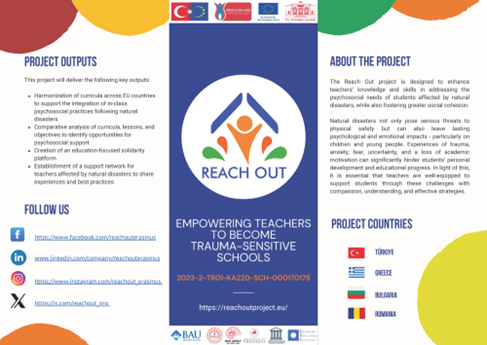
The REACH OUT Project seeks to strengthen teachers’ capacity to address the psychosocial needs of students affected by natural disasters and to foster social cohesion and emotional recovery in school communities. Supported under the Erasmus+ Program, the project emphasizes the vital role of teachers not only as educators but also as key agents of psychological resilience and social inclusion.
Empowering Teachers to Become Trauma-Sensitive Schools project brings together Bahçeşehir University (Türkiye) - Bahcesehir University - the University of Thessaly (Greece), the School Inspectorate of Teleorman County (Romania), and the Center for Educational Initiatives (Bulgaria), with key partners including the Istanbul Governor’s Office (Türkiye), Koç Schools (Türkiye), and Eyyübiye District Directorate of National Education (Türkiye).
Recognizing that natural disasters can cause profound psychological and emotional impacts—such as trauma, anxiety, fear, and loss of academic motivation—the project equips teachers with knowledge, pedagogical tools, and coping strategies to create supportive and trauma-sensitive learning environments.
Teachers are empowered to manage post-disaster crises, provide psychological first aid, and strengthen their own well-being while guiding students toward recovery.
The initiative brings together partners from multiple countries and involves comparative research and curriculum analysis across participating education systems. Through the review of national curricula, best practices, and training needs, REACH OUT develops an evidence-based framework and adaptable educational modules that can be applied across different contexts in Europe.
By integrating psychosocial awareness into teacher training, Bahçeşehir University (Bahcesehir University - BAU) and its international partners aim to contribute to inclusive and sustainable education systems, directly supporting SDG 3 (Good Health and Well-Being), SDG 4 (Quality Education), and SDG 10 (Reduced Inequalities).
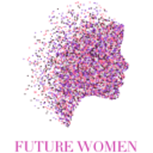
The Future Women Project is an international research and best practice development initiative, supported by the European Union’s Erasmus+ Programme, The project is implemented in partnership with Bahçehir University (Türkiye), Business Foundation for Education (Bulgaria), Danmar Computers (Poland), Found.ation (Greece), Mindshift Talent Advisory (Portugal), Oulu University of Applied Sciences (Finland), VivaFemina (Poland), and the University of Chemical Technology and Metallurgy (Bulgaria).
The image below shows screenshots from the official website of the FUTURE WOMEN Project, displaying Bahcesehir University and other international partner institutions.
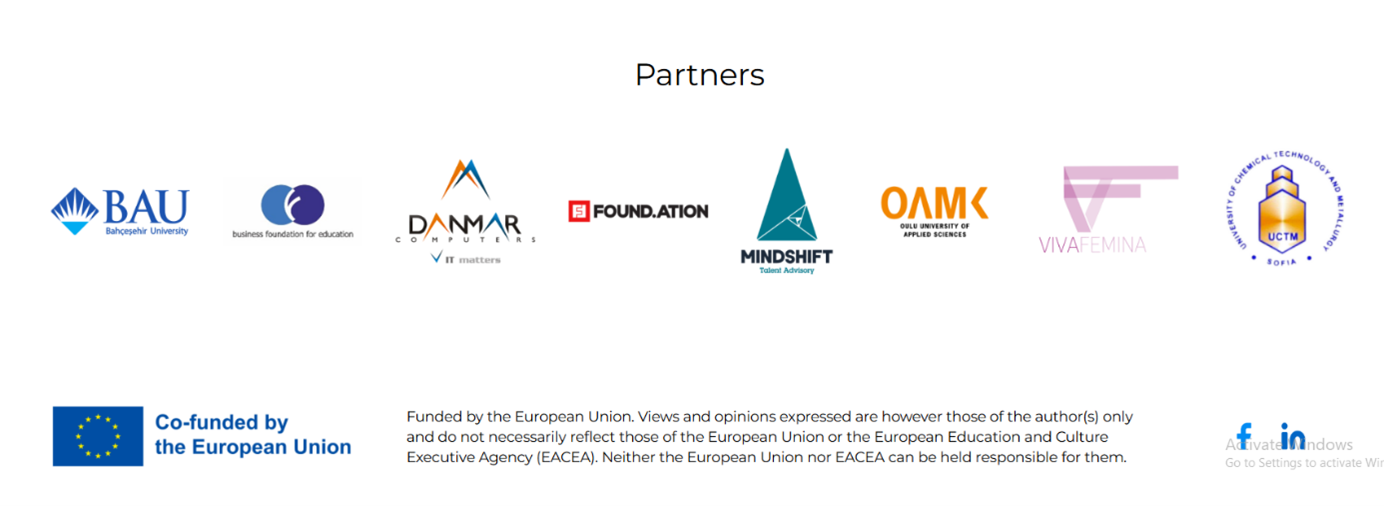
The project aims to strengthen the participation and leadership of women in the digital and STEM sectors, where female representation remains limited. By combining research-based evidence with applied training models, the initiative advances both policy innovation and capacity-building in the field of gender equality and digital transformation.
As part of the project, the Continuing Professional Development (CPD) Program has been designed for career counsellors seeking to adapt to the evolving realities of STEM and digital economy careers.
Grounded in comparative research and field analysis, the program introduces innovative methods and tools to better support female students in pursuing technology-related careers.
The CPD Program includes five key learning modules:
Through its dual focus on research, best practices development and practical implementation, Future Women contributes directly to SDG 5 (Gender Equality), SDG 8 (Decent Work and Economic Growth), and SDG 17 (Partnerships for the Goals) by promoting inclusive participation, evidence-based policymaking, and gender-responsive innovation in education and employment.
6.DIGICULTGAME: Innovative Tools to Digitize the East and West Cultural Heritage Project: SDG 4 (Quality Education), SDG 9 (Industry, Innovation and Infrastructure), and SDG 11 (Sustainable Cities and Communities)
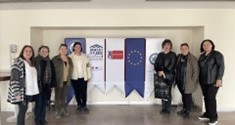
The DIGICULTGAME Project is an international research and innovation initiative that develops digital tools and methodologies to preserve and transfer tangible and intangible cultural heritage to future generations through digital game design.
Recognizing that cultural heritage—threatened by natural disasters and human activities—is a shared value that must be sustained, the project aims to digitize cultural assets and transform them into engaging interactive game narratives for young audiences.
Innovative Tools to Digitize the East and West Cultural Heritage project is carried out in partnership with Bahçeşehir University (Türkiye) – Bahcesehir University, Universitat Politècnica de Catalunya (Spain), University of Florence (Italy), NGO “Non-Formal Education for Youth” (Ukraine), Eskişehir Osmangazi University (Türkiye), Azerbaijan University of Architecture and Construction (Azerbaijan), Eskişehir Technical University (Türkiye), and the Equal Opportunity and Sustainable Future Association (Türkiye).
The image below shows a screenshot from the official website of the DIGICULTGAME Project, displaying Bahcesehir University and other international partner institutions collaborating to digitize and preserve Eastern and Western cultural heritage.
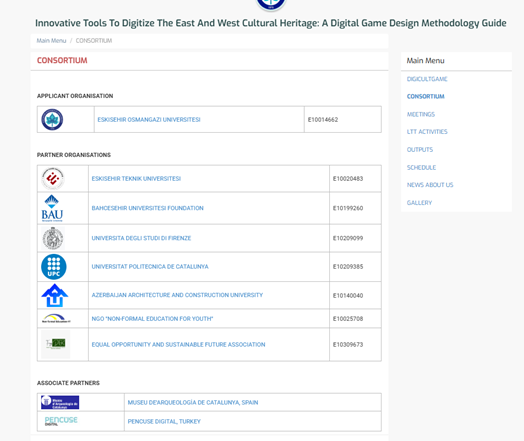
The project combines research, data collection, and applied design methodologies. It conducts background analyses, case studies, and player awareness assessments to inform the development of innovative training modules and a comprehensive e-learning platform.
These digital resources—featuring e-learning videos, documentary materials, and an e-book—support the creation of games that promote cultural awareness and intercultural understanding among youth.
By integrating research outcomes into practical learning environments, IGICULTGAME contributes to the digital transformation of cultural heritage, advancing education, innovation, and sustainable cultural preservation.
The project directly supports SDG 4 (Quality Education), SDG 9 (Industry, Innovation and Infrastructure), and SDG 11 (Sustainable Cities and Communities) through evidence-based knowledge generation and open educational access.
7- MIXAP: Developing Research Based Innovative Pedagogical Practices through Mixed Reality in Education Project: SDG 4 (Quality Education), SDG 9 (Industry, Innovation, and Infrastructure),

Bahçeşehir University (Türkiye) is a partner in the MIXAP (Mixed Reality in Education) project, an co-funded international research and best practice initiative coordinated by Le Mans Université (France), in collaboration with the Technical University of Denmark (Denmark)
The image below shows a screenshot from the official website of the MIXAP Project, displaying Bahcesehir University and other international partner institutions collaborating to develop research-based innovative pedagogical practices through mixed reality in education.
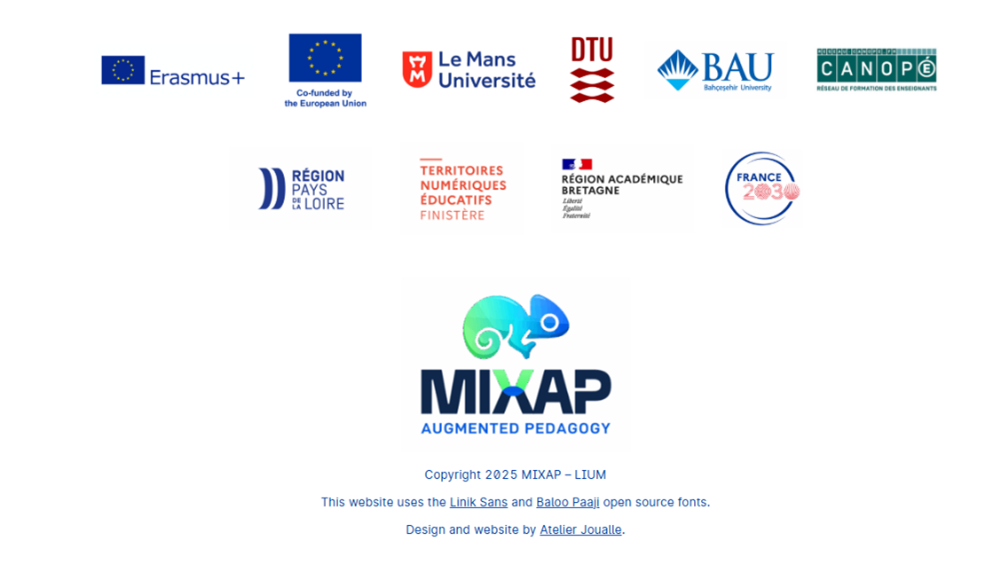
The project aims to empower teachers to design, implement, and evaluate Mixed Reality (MR) learning experiences, fostering a new pedagogical framework that combines technology, creativity, and evidence-based research. Through a co-design methodology, the consortium engages educators in participatory workshops, classroom pilots, focus groups, and cross-country collaboration to develop and refine interactive, inclusive, and impactful teaching practices.
MIXAP also contributes to academic research through peer-reviewed publications and conference presentations in the fields of educational technology, cognitive learning, and augmented pedagogy. Its practical outputs include the development of an easy-to-use AR authoring tool, open-access learning resources, and a sustainable international teacher community that shares innovative applications of MR in education.
By advancing both research-based evidence and scalable best practices, the project directly supports SDG 4 (Quality Education), SDG 9 (Industry, Innovation, and Infrastructure), and SDG 17 (Partnerships for the Goals), shaping the future of inclusive and technology-enhanced learning.
8.Bahçeşehir University’s Commitment to the SDG Accord and International Collaboration on SDG Data
The image below shows the official document confirming Bahcesehir University’s commitment to the SDG Accord and participation in international collaboration on SDG data.
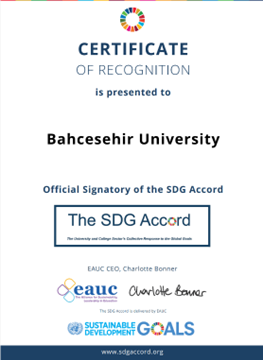
Bahçeşehir University is a proud member and signatory of the SDG Accord, which reinforces the vital role of higher education in achieving the United Nations Sustainable Development Goals (SDGs). Through this commitment, BAU actively participates in international collaborations focused on gathering, measuring, and reporting data related to the SDGs. The university contributes to global sustainability networks, shares progress and best practices annually, and takes part in the presentation of updated metrics at the UN High-Level Political Forum on Sustainable Development. This ongoing engagement reflects BAU’s dedication to advancing sustainable development within the global higher education community.
9.BAU– United Nations Institute for Training and Research (UNITAR). Collaboration through CIFAL Istanbul for SDG Policy Development and International Research
The image below shows the signing of the Memorandum of Understanding (MoU) between Bahcesehir University and the United Nations Institute for Training and Research (UNITAR), formalizing collaboration through CIFAL Istanbul for SDG policy development and international research
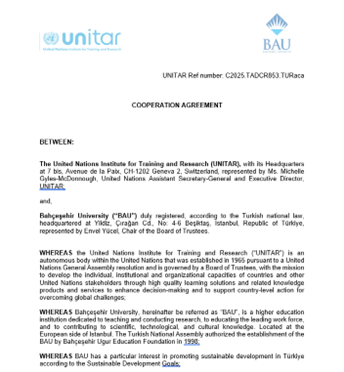
Bahçeşehir University (BAU) serves as the institutional host of CIFAL Istanbul, the International Training Centre for Authorities and Leaders, established in partnership with the United Nations Institute for Training and Research (UNITAR).
CIFAL Istanbul is part of the UNITAR Global CIFAL Network, a worldwide framework dedicated to capacity development, policy dialogue, and SDG-oriented training for government officials, policymakers, and local leaders.
Under the renewed Cooperation Agreement (2023–2025), BAU and UNITAR jointly design, implement, and evaluate programs that directly contribute to national and regional SDG policy development.
These activities include identifying systemic challenges, developing strategies for sustainable governance, modelling future policy scenarios, and monitoring the implementation of SDG-related interventions at local and regional levels.
Through CIFAL Istanbul, BAU engages in international collaboration and research that strengthens Türkiye’s and the broader Eastern European and MENA regions’ capacity to integrate the Sustainable Development Goals (SDGs) into policy and institutional frameworks.
Training and research programs focus on economic development, social inclusion, climate action, and digital transformation, with the goal of fostering data-driven policymaking and adaptive management practices across different levels of governance.
CIFAL Istanbul’s annual programs — comprising workshops, seminars, e-learning, and blended courses — reach local and national authorities, civil society representatives, international organizations, and private sector actors, creating a neutral platform for SDG-focused dialogue and knowledge exchange.
The Centre’s work contributes to advancing SDG 17 (Partnerships for the Goals) by strengthening international cooperation for sustainable development; SDG 16 (Peace, Justice and Strong Institutions) by improving governance capacities; and cross-cuttingly supports SDGs 4, 8, 11, and 13 through education, innovation, and climate-oriented policy learning.
Through this sustained partnership with the United Nations, Bahçeşehir University not only contributes to policy development and monitoring mechanisms for the SDGs, but also promotes international best practices, comparative research, and collaborative governance — positioning CIFAL Istanbul as a regional hub of excellence for sustainable development capacity-building and evidence-based policy support.